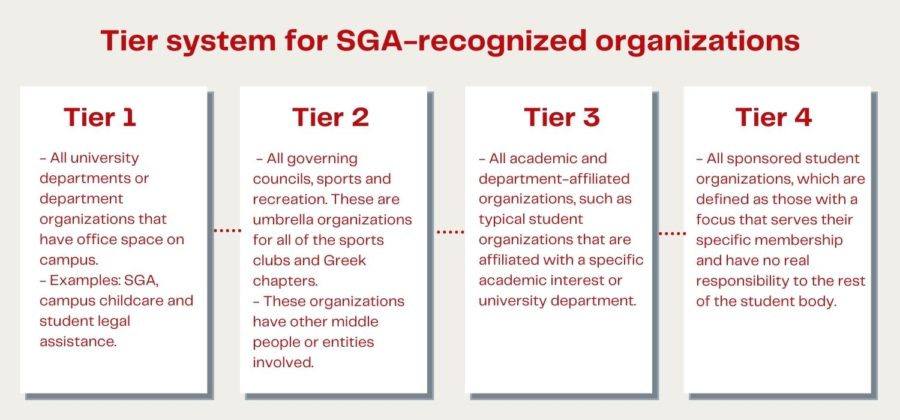Senate amends bylaws for student organizations, finance policy
A tier system will be used and it goes down based on the scope of the organization and how much money they need or want.
March 29, 2021
DeKALB – The Student Government Association Senate approved two bills at their virtual meeting Sunday. One bill makes changes to their student organization policy, and the other makes changes to SGA’s finance policy.
Student organization policy changes
With the changes to the student organization policy, the University Oversight Committee will be the primary approval of new and returning student organizations and referring the approved organizations to the Senate, chief of staff Meg Junk said. They would also review any constitution and bylaws updates for student organizations and provide approval.
The University Oversight Committee will be the first step in student organization conflict resolution, and will be concerned with making student organization policy recommendations each year to the Senate as they come up, Junk said.
“We’re really looking at how we make committees relevant and worthwhile and give senators responsibility beyond just coming and listening to the meeting every week,” Junk said.
Student organizations now need a minimum of five members to receive SGA recognition. The requirement for student organizations to have a treasurer has also been removed, making a president the only required position.
“The idea would be that they submit five names of interested members and by the time they get through, hopefully, there’s still three and they can build back up,” Junk said.
Student organizations no longer need to be open to non-NIU students but must state in their bylaws whether the organization is including or excluding community members.
The standard non-discrimination statement now includes a provision for interested parties who may not have the best intentions for that student organization.
Part-time students are now allowed to be officers for student organizations. Officers also must have at least a 2.5 GPA instead of a 2.0 GPA.
There are now five classifications for student organizations to codify how these organizations are operating: department organizations, governing councils, affiliated student organizations, sponsored student organizations and sports clubs.
An example of this would be Greek councils as affiliated organizations. They are strongly affiliated with a resource center on campus or an academic department, and may or may not have additional resources, Junk said.
“Most of the time when we’re looking at events coming through, they’re using space they have or have staff they’re pulling other resources for,” Junk said. “They have a different level of support. Not to say that they don’t deserve other support, but it helps us really figure out where we need to focus our attention, like orgs that don’t have coming in from another area — our sponsored student organization by SGA.”
Finance policy changes
SGA also made changes to their financial policy thus it has updated procedures and practices, redefined funding categories and the role of the finance committee, and worked to make funding opportunities more equitable, Speaker of the Senate Brad Beyer said.
“The SGA finance committee already assembles and breaks down all of the requesters of funds into categories, but this is really redefining those categories to be a little bit more relevant to the student org policy that we just introduced, and also kind of build in some other expectations and rules within each category,” Beyer said.
The finance committee will be approving supplemental funding requests instead of the Senate.
If we’re going to start pushing people and really opening up supplemental funding, then we don’t want each Senate meeting to be hours long,
— Brad Beyer
“If we’re going to start pushing people and really opening up supplemental funding, then we don’t want each Senate meeting to be hours long,” Beyer said. “This will allow committees to have a little bit more tangible work so senators feel like they have responsibility.”
Executive allocations are funds made available by the SGA president. They will be reserved for larger campus initiatives that serve larger portions of the student body.
A tier system will be used and it goes down based on the scope of the organization and how much money they need or want, Beyer said.
Tier one is for all university departments or department organizations that have office space on campus. SGA, campus childcare, student legal assistance and the HSC Oasis are all included in this tier. In tier one, there will be no maximum for funding requests and no requirement to present budgets to the Finance committee, according to Article II Section 2 of the revised SGA bylaws. Organizations will still have to fill out a request form.
“As we go through the fiscal year and economic circumstances change what the operations are going to look like, we didn’t feel it was necessary to impose a maximum for funding requests,” Beyer said. “It’s uncommon that a requesting organization or department gets the full amount that they asked for from the finance committee.”
Tier two is for governing councils and sports and recreation. These are umbrella organizations for all of the sports clubs and Greek chapters or other organizations where other middle person(s) or entities are involved in the distribution of funds for these. There will be no maximum for funding requests.
“So all of the sports clubs and Greek chapters — we don’t fund those individual entities,” Beyer said. “It goes through an overall umbrella organization for a council. Because it’s a little bit more complicated and the finance committee doesn’t necessarily directly see what happens to that money, we are going to require that they come and present to the finance committee.”
Tier three is for academic and department-affiliated organizations, such as typical student organizations that are affiliated with a specific academic interest or university department at NIU. The maximum annual funding for these organizations is $2,500.
Tier four is for sponsored student organizations, which are defined as organizations with a focus that serves their specific membership and have no real responsibility to the rest of the student body. They are allowed a maximum of $500 annually.
“The example that was used is the bread eating club,” Beyer said. “If you get a couple of students that are really interested in eating different types of bread, then there’s no real responsibility to the student body. It’s kind of like an affinity.”
Tiers one and two must submit their budget requests by the first week of November. Tiers three and four must submit their budget requests by the last week of February.
“Smaller student organizations that maybe have had some troubles recruiting members, or the seniors graduated and the new officers didn’t get the best transition, it seemed unfair to tell those orgs, ‘Hey, you missed the deadline so you missed out on any funding from the SGA and have to try again next fall,’” Beyer said. “In a way, it created an equity gap because we’re really only supporting very well-established organizations that have their stuff together, for lack of a better term.”
Any SGA recognized organization can request money; they don’t have to have annual funding, so this is supplemental to what they have already, Beyer said.














